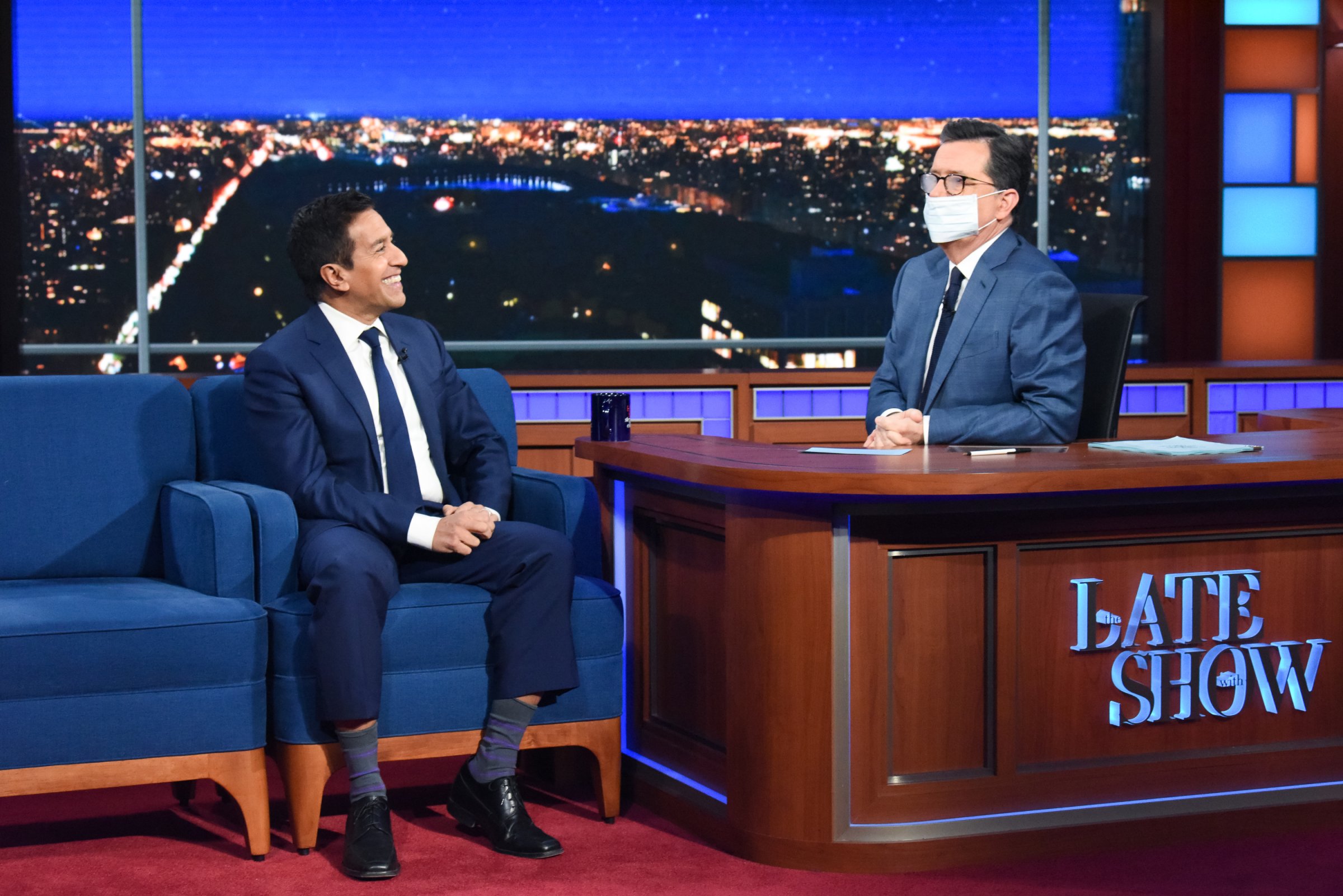
Outside the vortex of hysteria that is social media, there’s no more reliable gauge of the national mood at any given moment than late-night talk shows. And on Thursday, March 12, that mood was confusion.
Stephen Colbert opened The Late Show by running through an auditorium that was empty except for a few dozen staffers and then devoted the back half of his hour to a somber conversation with Dr. Sanjay Gupta about the coronavirus outbreak, the government’s response and how viewers could stay safe. Jimmy Fallon had a quick chat with Dr. Oz, then moved on to Mandy Moore. On Showtime’s Desus & Mero, amid much dark COVID-19 humor, the camera briefly pulled back to reveal one audience member wearing a surgical mask. Strangest of all was Jimmy Kimmel Live, where guest host Pete Buttigieg geeked out on Star Trek factoids with Patrick Stewart. Though Buttigieg made a point of demonstrating that his own sparse studio audience was spread out across the theater, the episode ended with a social-distancing nightmare of a performance from R&B stars Jhené Aiko and Miguel that featured a stretch limo’s worth of cool young people crowded around a tiny table playing cards.
As surreal as it was to watch shows that had all taped within hours of each other take such divergent approaches to a national crisis that was already shutting down the NBA, Disney theme parks and Broadway, it was also kind of comforting to see familiar faces puzzle out what to do—and how worried they should be—in something close to real time. No wonder network late-night ratings soared by upwards of 20 percent on Thursday. For those of us who had already holed up in our homes and were wrapping our minds around weeks of socially responsible self-isolation, late night offered a connection to the outside world. Which may explain why the news that rolled in over the next few days, that just about all of these series, from the broadcast stalwarts to John Oliver, Trevor Noah and Samantha Bee, were halting production felt so bleak. (Yes, even Real Time With Bill Maher—whose charming 64-year-old host dismissed COVID-19 anxiety earlier this month by cracking that “the response is to have a good immune system” and “people die, that’s what happens in life”—is on hold.)
These shutdowns are, without a doubt, the right response. TV news crews may have an obligation to keep the public informed about a situation that changes hourly, but it would be both stupid and selfish to expect late-night staffs to put themselves and their families at risk so that we can have new installments of “Carpool Karaoke.” And it’s not like these shows don’t take periodic hiatuses throughout the year. Yet it’s also understandable if Americans for whom every home has become an island (albeit one with cable, internet or at least a phone) feel a bit unmoored in the absence our favorite hosts. I’m not a habitual late-night viewer, and I’m already longing for a dose of avuncular wisdom from Colbert or some gallows humor from Seth Meyers.
If news programs help us understand what’s happening in the world around us, then it’s talk shows that often aid us in processing that information. Both Dan Rather and the host shed tears on David Letterman’s first episode after 9/11; staffers and audience members alike noted how encouraging it was to see that quintessential New York show return. On Bee’s Full Frontal the day after the 2016 election—when the outspokenly feminist host had been expecting to celebrate the first female POTUS—Lizzo’s bravura performance of “Lift Ev’ry Voice and Sing” and “Good as Hell” reminded viewers that life would go on. The next year, following the release of dashcam footage in which a police officer shoots Philando Castile and then orders his young daughter out of the vehicle, Noah told viewers: “When I watched this video, it broke me.” The normally calm host’s impassioned analysis of the incident, from the trauma that child must have experienced to the realization that a jury had ruled against the cop’s indictment even after seeing the video, momentarily halted a news cycle that was about to keep churning on.
Until coronavirus is under control, late night can offer us neither perspective nor catharsis. For that, we’ll have to rely on our households, the friends and family we can reach by phone, email or video chat and—God help us—the virtual public square of the internet. As Oliver said on Sunday, from a temporary studio that had been set up after a COVID-19 outbreak in Last Week‘s building, “I know that this disruption to your life is annoying. And it’s OK to be disappointed, or even irritated, because you can’t go out or your favorite events were postponed or a trip you had planned fell through—but you’ve got to get that out of your system.” He led viewers in 30 seconds of being “selfishly angry.” But before signing off for the foreseeable future, he urged us to get past our petty complaints and focus our energy and, if possible, money on helping those who stand to be hardest hit. Oliver is right. And, along with so many of his colleagues, he’ll be missed.
More Must-Reads From TIME
- Dua Lipa Manifested All of This
- Exclusive: Google Workers Revolt Over $1.2 Billion Contract With Israel
- Stop Looking for Your Forever Home
- The Sympathizer Counters 50 Years of Hollywood Vietnam War Narratives
- The Bliss of Seeing the Eclipse From Cleveland
- Hormonal Birth Control Doesn’t Deserve Its Bad Reputation
- The Best TV Shows to Watch on Peacock
- Want Weekly Recs on What to Watch, Read, and More? Sign Up for Worth Your Time
Contact us at letters@time.com